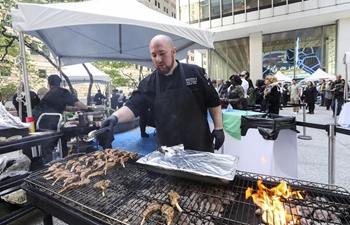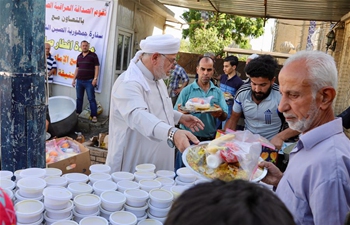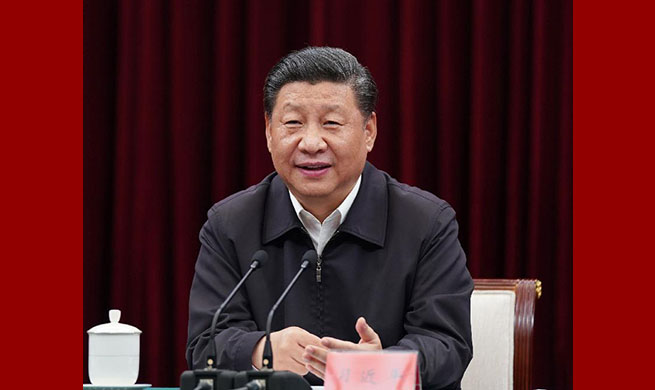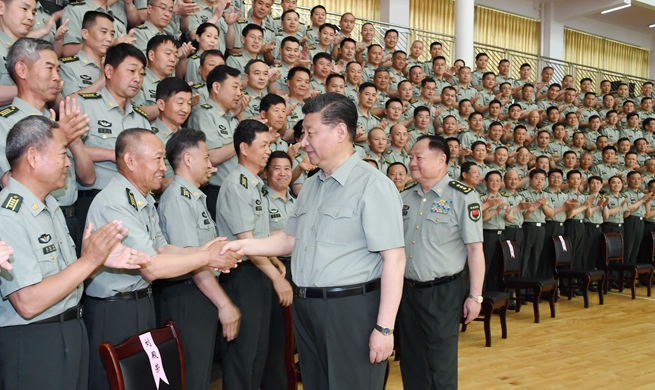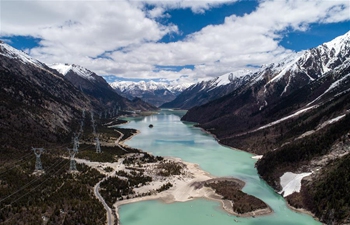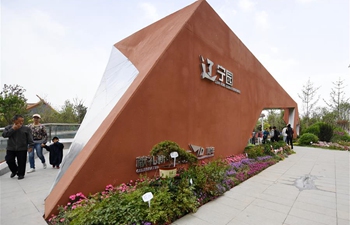UNITED NATIONS, May 21 (Xinhua) -- Libya is on the verge of civil war that could lead to permanent partition of the country and repercussions of the conflict will soon be felt by neighboring countries, the top UN (United Nations) envoy for Libya said on Tuesday.
"Libya is on the verge of descending into a civil war, which could lead to the permanent division of the country. The damage already done will take years to mend, and that's only if the war is ended now," Ghassan Salame, the UN secretary-general's special representative for Libya, told the Security Council in a briefing.
FROM BAD TO WORSE
The consequences and risks of the conflict are already painfully clear, especially for the Libyan people: over 460 dead, 29 of them civilians; over 2,400 injured, the majority of them civilians; over 75,000 people forced from their homes, all of them civilians. Over half of the displaced are women and children, said Salame.
Humanitarian actors estimate that over 100,000 men, women and children remain trapped in immediate front-line areas, with over 400,000 more in areas directly impacted by the clashes, he said.
The conditions for migrants and refugees in Libya have now gone from bad to worse, he said, adding nearly 3,400 refugees and migrants are trapped in detention centers exposed to, or in close proximity to the fighting.
Food prices are rising across the country as shortages start to occur. Insecurity and resource demands of the parties to the conflict are exacerbating these shortages, particularly with regard to fuel.
Another casualty of the conflict is Libya's infrastructure, including electricity and water. Already unable to meet demand, the water supply to the capital and the whole of northwest Libya has been weaponized as armed groups have cut off the Great Man-Made River, a network of pipes, to extract concessions. This act put tens of thousands of people in immediate danger and may constitute a war crime. Such acts must be condemned in the strongest terms, he said.
The security vacuum created by the withdrawal of many of Haftar's troops from the south of the country, coupled with the focus of the western forces on the defense of the capital, is already being exploited by terrorist groups, he said.
Since April 4, there have been four separate attacks conducted by Islamic State (IS) in the south of Libya, leaving 17 people killed, more than 10 others wounded and eight kidnapped, said the UN envoy. "Libyan forces that had in the past courageously defended their country against these terrorist groups are now busy fighting each other."
In addition to the innocent Libyans being ruthlessly subjected to the increasing terror of the IS, there will be a spillover of this violence to Libya's immediate neighbors, he warned.
AFTERMATH OF ATTACK ON TRIPOLI
"Forty-eight days into the attack on Tripoli by Gen. Haftar's forces, there has already been too much death and destruction," he said, referring to the new offensive on the Libyan capital launched on April 4 by Khalifa Haftar's self-proclaimed Libyan National Army.
The offensive against Tripoli came on the eve of the holding of a national conference in the Libyan city of Ghadames, a key event in Libya's political process.
"To see those who had enthusiastically accepted our invitation to Ghadames suddenly take up arms against each other to attack the capital, or to defend it, has thrown me into the deepest level of sadness for the opportunity lost and for a hope killed exactly 10 days before its realization," Salame said.
The attack on Tripoli also imperiled the potential of the talks held on Feb. 27 in Abu Dhabi, the United Arab Emirates, between Prime Minister Fayez al-Sarraj and Haftar, the sixth of its kind between them, he said.
During their talks, there had been the real opportunity to replace the Government of National Accord in Tripoli, dissolve the parallel government in Beida and create an inclusive, unified national government, which would have shepherded the country through the election process to the end of the transitional period, according to Salame.
The understandings reached in Abu Dhabi had also placed the military under civilian control, a key demand of the vast majority of Libyans and many in the international community, he added.
TO STOP FLOW OF ARMS
Despite an arms embargo imposed by the Security Council, weapons are pouring in to all sides. Many countries are providing weapons to all parties in the conflict without exception. The amount and sophistication of these weapons are already causing greater numbers of casualties, he said.
"Without a robust enforcement mechanism, the arms embargo into Libya will become a cynical joke. Some nations are fueling this bloody conflict. The United Nations should put an end to it," he added.
The conflict has been characterized by the use of airstrikes, heavy artillery and indiscriminate shelling of residential areas, he said.
The large number of casualties has overburdened already weakened health facilities struggling with shortages of medical personnel and supplies. Eleven ambulances were directly hit by airstrikes, rockets and shelling while on duty.
There is no military solution to Libya, said Salame. "It is high time for those who have harbored this illusion (of military solution) to open their eyes and adjust themselves to this reality."
He said that a better future is still possible, but we all must be seized with the fierce urgency of now while the front lines remain on the outskirts of Tripoli and before the battle moves to the capital's more densely populated neighborhoods.
"I fear that without immediate action to stop the flow of arms and pressure on Libyan parties to the conflict to enable a return to serious dialogue, Libya will descend into civil war which could potentially lead to a Hobbesian all-against-all state of chaos or partition of the country," he said.
He asked the Security Council to take up its responsibility to call for the silencing of the guns and the warring parties to engage with the UN mission in Libya to ensure a full and comprehensive cessation of hostilities and a return to an inclusive UN-led political process.
The Security Council has so far failed to come up with any "product" -- either a resolution or a statement. Two weeks into the new flare-up, a British-drafted resolution demanding a cease-fire in Libya was unable to be put to vote as the text could not win support of two veto-wielding permanent members of the council.


